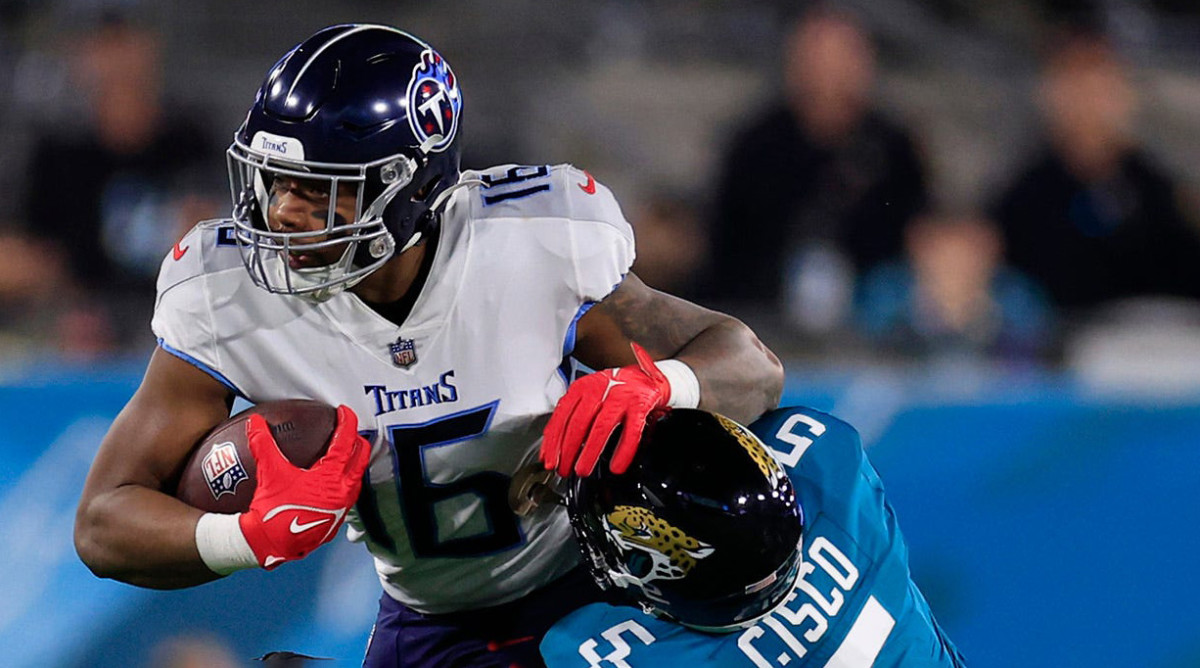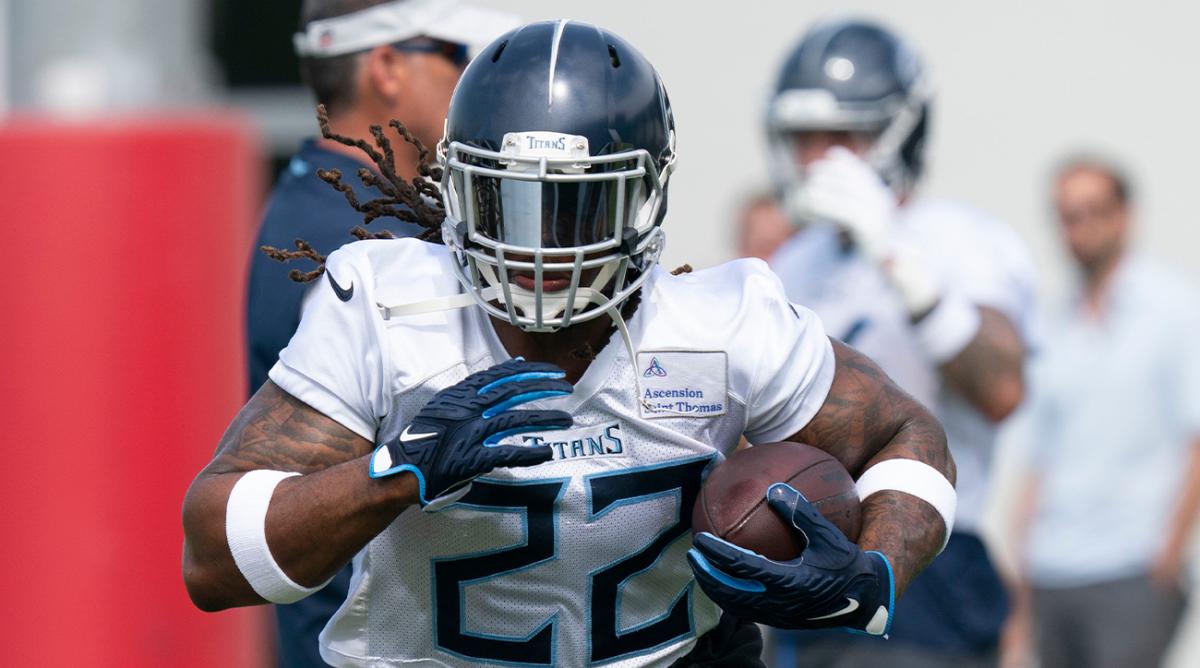The Replacements: Titans Will Rely on In-House Talent to Get Available Targets
Editor’s Note: Welcome to the second annual installment of “The Replacements,” an SI fantasy football series focused on vacated volume and projecting how teams will replace production year-to-year. This offseason, we’re looking at the six teams with the highest percentage of available targets and the six teams with the highest percentage of available carries heading into 2023.
- The Replacements (Targets): Houston Texans | Carolina Panthers | Detroit Lions | Green Bay Packers
- The Replacements (Carries): Carolina Panthers | Denver Broncos | Detroit Lions | Buffalo Bills | Minnesota Vikings | Philadelphia Eagles
Only two teams attempted fewer passes than the Titans last season. Injury limited quarterback Ryan Tannehill to 12 games and running back Derrick Henry shouldered the second-heaviest workload of his career as a result.
Tannehill, just a few years removed from the best year of his career, will be back under center in the fall but Tennessee's top targets from 2022 are no longer with the team. Wide receiver Robert Woods was released in February and signed with the Texans soon after; tight end Austin Hooper left for the Raiders in free agency. Neither player topped 600 receiving yards last season. In fact, the Titans finished with the fourth-fewest passing yards in the NFL (3,227) and passed on just 50.9% of their plays, the sixth-lowest rate in the league.

All told, Tennessee ranks fourth in percentage of vacated targets (45.6%), according to 4for4, but is tied for eighth in total available targets (199). So while there are not as many available opportunities in this offense as the other teams featured in this series, there’s a sizable chunk of the pie up for grabs.
Also unlike some of the other highlighted offenses, the Titans did not spend significant — or really any — resources in the draft or free agency to add a pass-catcher. They spent their first-round pick on offensive lineman Peter Skoronski and selected quarterback Will Levis at the top of the second round. The notable targets are all returning players: receivers Treylon Burks and Nick Westbrook-Ikhine; tight end Chigoziem Okonkwo; and Henry. Chris Moore, who was brought in on a one-year deal, was the only real addition to the receiver room.
With a sound defense, head coach Mike Vrabel at the helm and a win total set at 7.5, this team still figures to be competitive in the AFC South. Tannehill has supported a WR1 in the past (A.J. Brown in 2020) and his return should be a shot in the arm for this unit overall.
These are the players set to step up in Tennessee’s passing offense this season.

Treylon Burks
Injuries limited Burks to 11 games as a rookie as he landed on injured reserve early in the year with turf toe and a concussion sidelined him for multiple games later on. Drafted to be Brown’s replacement, Burks flashed at times, most notably with a seven-catch, 111-yard performance against the Packers. He finished with 33 catches on 54 targets for 444 yards and one touchdown for the season. Despite his injuries, he led all Titans receivers with eight plays of 20-plus yards and his 40.4 receiving yards per game also paced the team.
Burks was selected 18th overall out of Arkansas as a junior fresh off a first-team All-SEC selection. He racked up 1,104 yards and 11 touchdowns on 66 catches that season and his best game came against Alabama, when he finished with 179 yards and two scores on eight receptions.
If fully healthy, Burks should see somewhere in the neighborhood of 100 targets, which is only marginally more than the 85 he was on pace for over a 17-game season. (Woods’s 91 led the team last year.) Burks is a big-play threat who averaged better than 16 yards per catch every year with the Razorbacks and 13.5 per reception as a rookie. He certainly has the potential to outperform his WR36 average draft position (ADP) if he does field the volume of a true WR1, even in a low-volume passing offense.
Chigoziem Okonkwo
Okonkwo’s 14.1 yards per catch last season ranked 22nd in the NFL and first among all tight ends. Notably, yards after the catch accounted for more than half of that mark and his 7.9 YAC average was tied for 13th-best in the league as a rookie. In total, he gained 450 yards (second-most) on 32 catches (fifth-most).
As a 6’3”, 238-pound tight end who ran a 4.52 40-yard ash, Okonkwo can certainly do damage in the open field, but he should also be more involved in the red zone in 2023. Tennessee has historically been an efficient offense inside the 20 and Woods’ 13 red-zone targets and Hooper’s six are there for the taking. Okonkwo saw six targets in that area of the field last season and caught three, two of which went for scores.
Fantasy managers are cautiously optimistic about what Okonkwo can do in his second year in the league considering his TE13 ADP is up substantially from his TE25 finish. Okonkwo was the TE7 from Weeks 12-18 as he had three or more catches in all but one game during that stretch, which could be a preview of what’s possible when tasked with a larger role. Okonkwo played just 37% of the snaps in his first year while Hooper and Geoff Swaim were both over 50%. With Hooper and Swaim gone, Okonkwo now has very little competition in the room.
Michael Fabiano dubbed Okonkwo one of his three breakout tight ends and wrote “it wouldn’t be a surprise to see Okonkwo rank among the three most targeted players on the team.”
Nick Westbrook-Ikhine
Westbrook-Ikhine helped the Titans stretch the field last season with an average depth of target of 12.8 yards, a top-25 mark in the NFL. His 15.8 yards per catch were the most on the team for any player who hauled in more than 10 passes but his production was actually still down from his second year in the league.
A large chunk of his 397 receiving yards and the majority of his total touchdowns came in a single game against the Broncos. Westbrook-Ikhine went for 113 yards and two touchdowns on five catches and finished as the WR5 that week — he didn’t have another top-30 finish.
There’s reason to believe Westbrook-Ikhine’s volume will increase simply by necessity. Burks is the only returning player who saw more targets than the 50 he fielded in 2022. Perhaps Westbrook-Ikhine develops a bit more consistency this year — he had four games with zero receptions last season — but it’s extremely unlikely he’s reliable week-to-week for fantasy purposes.

Derrick Henry
Henry is by no means a pass-catching back. Up until last year, he had never had 20 receptions in a season but he had a career year as a receiver in 2022. Henry’s 41 targets, 33 catches and 398 receiving yards were all career-highs by a considerable margin.
That production in the passing game helped him to his second-best fantasy season ever and crucially gave Vrabel another weapon on an offense that was lacking pass-catching threats. Henry’s 0.1 average depth of target was a career high and his 11.7 yards after contract per reception led the NFL.
Henry’s involvement as a receiver did not take away from his rushing workload in the slightest. He still led the league in carries (349) and came pretty close to 400 touches. After unleashing Henry on short passes to great success last season, perhaps the Titans go back to the well more often this year.
Other Receivers
The rest of Tennessee’s weapons are nothing to write home about. Kyle Philips, a fifth-rounder out of UCLA in 2022, caught eight passes in four games as a rookie before injuries sidelined him for the season. He got off to a hot start by leading the team in receiving in the opener with six catches for 66 yards but he’s a bit of an unknown commodity heading into Year 2.
Moore is coming off a career year in Houston, where he ranked second on the team in virtually every major receiving category. He hauled in 48 passes on 74 targets for 548 yards, which was almost as many as he had in his career up to that point. Moore doesn’t currently profile as a starter with Philips ahead of him in the pecking order.
The most notable skill position addition to the group was running back Tyjae Spears out of Tulane. The Titans took him in the third round after he exploded for 1,581 rushing yards and 19 touchdowns. Spears was moderately involved as a receiver for the Green Wave with 41 catches over the last two years.
Summary
An ideal fantasy roster likely isn’t littered with Titans pass-catchers. However, Okonkwo and Burks both feel like values in drafts heading into their sophomore seasons. With health on his side, Burks has a shot to come closer to delivering on the promise of becoming Brown’s successor — the opportunities are there at least. And the same goes for Okonkwo, who flashed even as Hooper drew more targets than him. Beyond those two, the rest of the pass-catchers are not worth drafting and it shouldn’t be too hard to abstain considering none are coming off the board with top-200 picks. It’s unclear whether Henry’s increased involvement in the passing game was a one off or a sign of things to come. If he does set career-highs as a receiver again he’s bound to deliver on his current RB8 ADP at the top of the third round.
